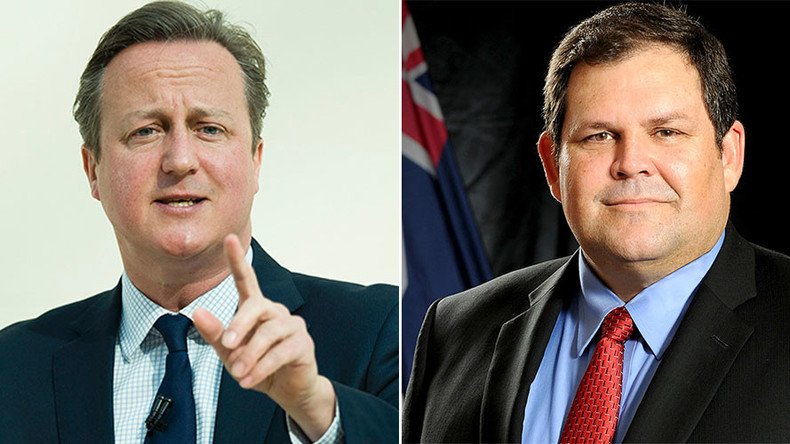Tax haven brands Cameron’s strategy for ‘tackling’ financial secrecy futile

Cayman Islands officials have dismissed UK Prime Minister David Cameron’s latest transparency drive as “pointless,” while anti-corruption campaigners demand he halt the laundering of illicit assets pumped through Britain by foreign criminals.
Government officials based in the Caribbean tax haven attacked the PM’s pro-transparency rhetoric ahead of an anti-corruption summit being held in Britain on Thursday. Proposals mooted in the run-up to the conference have sparked widespread debate and cynicism.
The Cayman Islands had requested to take part in the summit, hosted by Cameron in a mansion in London’s West End. The event has been billed as a concerted drive to unveil corruption in Britain and abroad, while building pragmatic steps to address money laundering, tax evasion and other forms of white-collar crime.
Assault on transparency
Minister of Financial Services, Commerce and Environment for the Cayman Islands, Wayne Panton, said the tax haven already has a more efficient strategy for uncovering corruption and white-collar crime than that proposed by Cameron.
The British PM had previously called on UK-controlled secrecy jurisdictions such as the Cayman Islands to name their ultimate owners in a public register.
But in an exclusive interview with the Financial Times, Panton argued the UK’s decision to publish these registers could be viewed as poor policy-making because there is no requirement for the information uploaded on it to be verified.
“The small element of abusers of the international financial system ... are the very people who are not going to be honest with voluntary disclosures,” he said.
If David Cameron wants to achieve anything at the anti-corruption summit this week, he must do this: https://t.co/Cj91qls9cA
— tom_watson (@tom_watson) May 11, 2016
In a vigorous assault on transparency, the Cayman Islands finance minister dismissed the strategy of placing the verified data on a public forum, claiming this would only see money moved to “a jurisdiction that respects privacy more.”
He went on to suggest there is a clear difference between privacy and secrecy, an argument that is strongly rejected by anti-corruption experts.
Britain is the most prolific player in the global arena of financial secrecy. Although Britain itself was ranked number 15 on the Tax Justice Network’s (TJN) Financial Secrecy Index last year, it controls a complex web of tax havens – or secrecy jurisdictions – across the globe. Among these are the Cayman Islands, Jersey, Bermuda and Gibraltar.
The TJN says if Britain and this opaque network of tax havens were considered as a singular jurisdiction, it would be ranked as the top region in the world in terms of financial secrecy.
Key secrecy indicators, according to the index, are low levels of transparency in the banking sector, a culture that promotes tax dodging and a lack of public registers showing company ownership.
While the Cayman Islands and UK-controlled jurisdictions such as the British Virgin Islands have made some ground in curbing financial secrecy, they are still widely considered tax havens. The Cayman Islands was ranked number five on the TJN's Financial Secrecy Index last year.
Panama Papers link
Central to Cameron’s strategy for tackling corruption at home and abroad is a proposed cross-border, anti-corruption agency devoid of law enforcement powers.
The body will likely assist law enforcement agencies and anti-corruption investigators across the globe in identifying and tackling illicit financial flows. However, it will be solely reliant on other state and cross-border organizations to hold white-collar criminals to account.
Britain has been described by tax justice and anti-corruption experts as the money laundering capital of the world. Cameron has repeatedly pledged to tackle corruption, but Tory action on the ground has been sorely lacking.
The explosive Panama Papers leak, which rocked the global financial world last month, confirms the key role Britain plays in facilitating money laundering and white-collar crime.
UK's PM David Cameron hosts an international anti-corruption summit. Hypocrisy much? https://t.co/3lSnLHwFFV
— teleSUR English (@telesurenglish) May 10, 2016
Dubbed the most expansive data leak in the history of journalism, the files came from Panama-based law firm Mossack Fonseca.
The latest tranche of documents concerning the landmark leak – released on May 9 – contained almost 5,000 British addresses. It also contained thousands of others relating to UK-controlled secrecy jurisdictions.
The data was initially handed to German newspaper Süddeutsche Zeitung from an unknown source and later shared with the International Consortium of Investigative Journalists (ICIJ).
The explosive database includes company names, addresses, and individuals, but does not shed light on specific financial flows. It is viewable on the ICIJ’s website.












